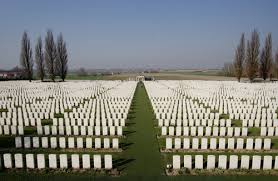
A few years ago, on a holiday in France, my wife and I visited the Somme battlefield near Amiens to see the grave of her great uncle, Alfred Gaby, who had been killed during the final months of the first world war. After visiting the cemetery where he was buried, we then drove back along the road going west through the little villages with names that are familiar to many Australians because roads, parks and towns are named after the battles where so many soldiers lost their lives. Poziers, Bapaume, Hamel and Peronne are street names in various suburbs in Brisbane.
I think people have different reactions to visiting these sites. We drove through Poziers where around 7000 Australian soldiers were killed in four weeks of fighting and then on to the ridge top of Thiepval where a very large British memorial overlooks the slopes where thousands of soldiers from the Pal’s Battalions were cut down with machine guns. Despite the carefully kept graves and gardens in the cemeteries, these are not peaceful places to walk around. Nonetheless, its hard to grasp the scale of the killing by looking at memorials and reading about numbers of dead and wounded.
The last place that we visited was the Newfoundland Memorial at Beumont-Hamel, which was quite different from the other memorials on the Somme. Here it is possible to walk through the trenches and walk across no-mans land to the German trenches. It’s possible to think about glory and sacrifice at the neatly kept memorials but its hard not to be affected by the experience of stepping out of a trench and looking over the hundreds of meters of flat land to the well-defended enemy trench. After a few moments of comprehending what had happened here on the 1st of July, 1916, my overwhelming reaction was that of outrage over the stupidity of the Western Front. Why did this all have to happen? What would it have taken to stop it?
Sometimes history moves with a path dependent momentum that makes change very difficult. The correspondence between the Kaiser and the Czar (Nicky and Willy) is fascinating to read. While both men are heads of state and cousins, they are unable to stop the events that both know will lead to senseless carnage and destruction. There is a desire from both men to act, but the challenges of altering course are too great to overcome.
I think the lesson from this is that it takes a great degree of effort and leadership to make changes when we are talking about society, global politics and the economy. The morally correct action might be obvious but that does not ensure that the right outcome will eventuate.
What are the global challenges that we are facing today? Think about poverty, reforming the banking system and responding to climate change, for example. Do we have the courage and capacity to lead the change, or are we still marching to the guns of August?
